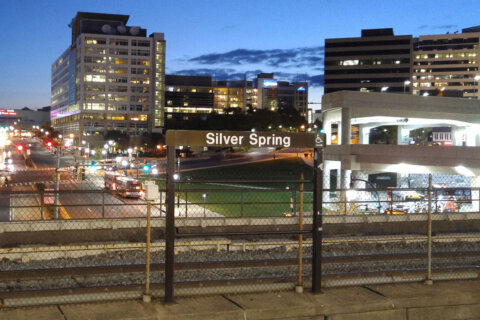This article was republished with permission from WTOP’s news partners at Maryland Matters. Sign up for Maryland Matters’ free email subscription today.
This content was republished with permission from WTOP’s news partners at Maryland Matters. Sign up for Maryland Matters’ free email subscription today.
Montgomery County is considering whether to shift to an all-electric building standard, a decarbonization effort that would be the first of its kind in Maryland.
If the proposed bill passes, Maryland’s largest county would become the third jurisdiction on the East Coast to enact this type of legislation, joining a growing number of local governments across the country, according to the Chesapeake Climate Action Network.
Councilmember Hans Riemer (D) is the lead sponsor of the bill, which is co-sponsored by Councilmember Will Jawando (D); County Executive Marc Elrich (D) supports the proposal. A public hearing on the measure was held this week.
“The latest U.N. report on climate change delivered a stark warning, but also a path forward to avert calamity,” Riemer said in a June 13 statement.
“We need action — at all levels of government and society — now. This legislation, combined with cleaning up the electricity grid and retrofitting existing buildings, will go a long way to reducing and eventually eliminating climate change causing emissions from our County’s building sector.”
Bill 13-22 would require the county executive to issue all-electric building standards for new construction, major renovations, and additions by Jan. 1, 2024. There would be exceptions for “manufacturing, crematories, life sciences, and commercial kitchens.”
Schools and “income restricted” housing would be allowed more time to meet the standards.
The bill wouldn’t not affect current buildings.
Elrich and Riemer wrote a memorandum in support of the bill back in June when the bill was introduced, stating that it’s in-line with a recommendation by the Maryland Commission on Climate Change.
“All-electric building standards are a crucial step for the County to achieve its zero-greenhouse gas emissions goal through ensuring future construction is electrified,” the two wrote.
Emissions from buildings are 50% of the county’s total greenhouse gas emissions, according to the memorandum.
The law could have a “favorable impact” on social justice and equity in the county as its people of color could disproportionately gain from reductions in greenhouse gas emissions, according to a racial equity and social justice impact statement prepared by the Office of Legislative Oversight.
During a 40-minute public hearing on Tuesday, many members of the community spoke for and against the bill.
Environmental organizations showed support for the bill, hosting a rally in the afternoon advocating for its passage.
Takoma Park City Councilmember Peter Kovar called the bill “a key next step” in reducing the county’s carbon footprint. And he said the move would be in-line with investments that Takoma Park has made to reduce greenhouse gas emissions including $285,000 in grants toward that purpose.
Jonathan Lacock-Nisly, the director of faithful advocacy at Interfaith Power & Light, an environmental group for religious organizations in the region, said that many congregations have experienced declining infrastructure and gas leaks in their churches.
“The consequences of our dirty energy system are all too relatable,” Lacock-Nisly said.
Speaking against the measure were representatives from the Greater Silver Spring and Greater Bethesda chambers of commerce and Washington Gas, among others.
Opponents said that the bill would hamper the ability to deliver gas to customers and that the power grid in Montgomery County wouldn’t be able to keep up with demand.
Russell Lacey, chair of the executive committee at the Greater Bethesda Chamber of Commerce, said he was concerned that the county doesn’t have a plan for implementing the bill and wouldn’t be able to handle emergency situations, such as a widespread power outage following a winter storm.
Lacey said that electric company Pepco’s hesitancy to support the bill was one of the main reasons he thinks the council should hold off on passing it.
“Pepco’s pause should cause you to pause as well,” Lacey said.
Some critics said they want the council to wait for a study to be published before voting on the legislation.
All-electric buildings can be more expensive to construct than current standards, but they are less costly to operate once finished, according to a fiscal analysis of the bill.
Not every speaker had an entirely positive or negative position on the measure.
Montgomery Agricultural Producers, a nonprofit organization which represents the interests of Montgomery farmers, supported the bill with amendments, said Bob Cissel, the group’s director.
Cissel said farmers use a lot of electricity but sometimes have to use natural gas for operations such as drying corn and soybeans.
No electrical dryer that can function at the same scale, Cissel said. Forcing farmers to go all-electric might restrict them as they try to expand.
“We wouldn’t have capital investment to change our systems,” Cissel said. “In some instances the technology is not there to change the systems.”
The a work session on the bill by the council’s Planning, Housing, and Economic Development Committee is tentatively scheduled for Oct. 17.







